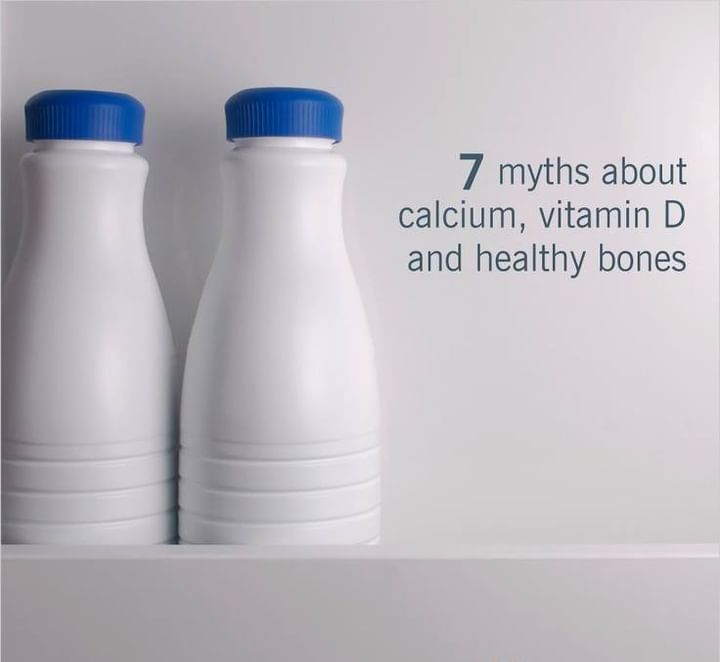Get the App
For Doctors
Login/Sign-up
Last Updated: Aug 29, 2019
BookMark
Report
7 Myths About Calcium, Vitamin D and Healthy Bones
Dr. Deepa SharmaAyurvedic Doctor • 16 Years Exp.M.Sc Clinical Nutrition & Dietetics, P.G.Diploma in pachakarma, Bachelor of Ayurveda, Medicine and Surgery (BAMS)
Osteoporosis, a condition in which bones become porous and easily shatter, can rob us of independence as we age.
Getting enough calcium and vitamin D can prevent osteoporosis and help us remain active and independent.
Myths about calcium, a mineral found in many foods, and vitamin D, absorbed from food and sunshine, are common. Below, two Cleveland Clinic experts from our Endocrine Calcium Clinic offer the facts:
Myth #1: Only elderly women develop osteoporosis.
Fact: Osteoporosis is most common in women over age 65. However, osteoporosis occurs in men and in younger women too. Women who start menopause early are at risk, for example. So is anyone taking medications such as long-term steroids, certain blood thinners, seizure drugs or medications for acid reflux.
Anyone, male or female, who doesn’t exercise or whose diet is low in calcium or vitamin D is also at risk of osteoporosis. Diseases that interfere with bone health, such as celiac disease and hyperparathyroidism, may also result in osteoporosis.
Bone density evaluation — typically recommended for women starting at age 65 — should begin earlier if you are at risk. “Seeing a physician for this evaluation is critical,” says endocrinologist Leila Khan, MD. A doctor with expertise in the diagnosis and treatment of osteoporosis will make recommendations based on your personal and family health history.
Myth #2: If you’re lactose-intolerant, you can only get calcium from supplements.
Fact: Lactose intolerance, in which the natural sugar in milk products causes belly pain, gas and bloating, is common. But not all dairy products are off-limits for those with the condition. “Yogurt that has live cultures in it has very low levels of lactose,” says internist and metabolic specialist Susan Williams, MD. “Similarly, aged cheeses have little or no lactose.” Nondairy foods that can help supply calcium include dark leafy greens and calcium-fortified foods such as cereal and juice.
Myth #3: You can’t take calcium supplements if you have trouble swallowing pills.
Fact: Chewable supplements are an option. Calcium citrate is better absorbed than calcium carbonate, and calcium citrate supplements come in chewable form. “My personal favorite is calcium gummies — they are very easy to take, provide an easily absorbed form of calcium that does not have to be taken with meals, and taste great,” says Dr. Williams.
Myth #4: It’s not a big deal if you forget to take your calcium supplements.
Fact: Your body needs to maintain a constant level of calcium to keep your bones strong and your muscles functioning. “If you do not get enough calcium in your diet, your body will take some calcium from the bones in order to keep the blood calcium levels normal,” explains Dr. Williams. That is why most of us require calcium supplements if we do not get the recommended 1,200 milligrams or more of calcium per day in our diet.
Myth #5: There’s an ‘ideal’ dose of vitamin D.
Fact: Many adults are deficient in vitamin D, but experts debate the frequency and dose of supplementation. “At this time, it is unclear what the ideal dose of vitamin D should be,” says Dr. Khan. Depending on your level of vitamin D, physicians may recommend high doses (50,000 international units or IU) once a week or once a month to correct deficiencies, or a daily dose of 2,000 to 4,000 IU. Either way, blood tests should prove that the deficiency is corrected, which can take several months. Dr. Khan looks for vitamin D levels of 30 to 40 milligrams per deciliter in her patients. “Higher numbers can be OK, but a low number can be detrimental to bones and potentially cause bone loss,” she says.
Myth #6: Eating dairy and taking calcium are all that’s needed to prevent osteoporosis.
Fact: You need to make healthy lifestyle choices too. That means avoiding excess alcohol, not smoking, keeping your weight in check and exercising regularly. Routine workouts — including walking and other weight-bearing exercises — will help maintain muscle and bone strength. “Keeping your muscles strong will prevent falls — and if we can prevent falls, we can often prevent broken bones,” notes Dr. Williams.
Myth #7: You can’t get too much calcium.
Fact: Too much calcium is not a good thing. If your calcium levels are too high, “stay off the calcium supplements, including Tums®!” says Dr. Khan. “I would be careful how much vitamin D you are taking and would discuss stopping hydrochlorothiazide medication for blood pressure with your physician, since these can result in higher calcium levels.” If you have persistently high calcium levels, don’t ignore them — seek an evaluation from an expert
Getting enough calcium and vitamin D can prevent osteoporosis and help us remain active and independent.
Myths about calcium, a mineral found in many foods, and vitamin D, absorbed from food and sunshine, are common. Below, two Cleveland Clinic experts from our Endocrine Calcium Clinic offer the facts:
Myth #1: Only elderly women develop osteoporosis.
Fact: Osteoporosis is most common in women over age 65. However, osteoporosis occurs in men and in younger women too. Women who start menopause early are at risk, for example. So is anyone taking medications such as long-term steroids, certain blood thinners, seizure drugs or medications for acid reflux.
Anyone, male or female, who doesn’t exercise or whose diet is low in calcium or vitamin D is also at risk of osteoporosis. Diseases that interfere with bone health, such as celiac disease and hyperparathyroidism, may also result in osteoporosis.
Bone density evaluation — typically recommended for women starting at age 65 — should begin earlier if you are at risk. “Seeing a physician for this evaluation is critical,” says endocrinologist Leila Khan, MD. A doctor with expertise in the diagnosis and treatment of osteoporosis will make recommendations based on your personal and family health history.
Myth #2: If you’re lactose-intolerant, you can only get calcium from supplements.
Fact: Lactose intolerance, in which the natural sugar in milk products causes belly pain, gas and bloating, is common. But not all dairy products are off-limits for those with the condition. “Yogurt that has live cultures in it has very low levels of lactose,” says internist and metabolic specialist Susan Williams, MD. “Similarly, aged cheeses have little or no lactose.” Nondairy foods that can help supply calcium include dark leafy greens and calcium-fortified foods such as cereal and juice.
Myth #3: You can’t take calcium supplements if you have trouble swallowing pills.
Fact: Chewable supplements are an option. Calcium citrate is better absorbed than calcium carbonate, and calcium citrate supplements come in chewable form. “My personal favorite is calcium gummies — they are very easy to take, provide an easily absorbed form of calcium that does not have to be taken with meals, and taste great,” says Dr. Williams.
Myth #4: It’s not a big deal if you forget to take your calcium supplements.
Fact: Your body needs to maintain a constant level of calcium to keep your bones strong and your muscles functioning. “If you do not get enough calcium in your diet, your body will take some calcium from the bones in order to keep the blood calcium levels normal,” explains Dr. Williams. That is why most of us require calcium supplements if we do not get the recommended 1,200 milligrams or more of calcium per day in our diet.
Myth #5: There’s an ‘ideal’ dose of vitamin D.
Fact: Many adults are deficient in vitamin D, but experts debate the frequency and dose of supplementation. “At this time, it is unclear what the ideal dose of vitamin D should be,” says Dr. Khan. Depending on your level of vitamin D, physicians may recommend high doses (50,000 international units or IU) once a week or once a month to correct deficiencies, or a daily dose of 2,000 to 4,000 IU. Either way, blood tests should prove that the deficiency is corrected, which can take several months. Dr. Khan looks for vitamin D levels of 30 to 40 milligrams per deciliter in her patients. “Higher numbers can be OK, but a low number can be detrimental to bones and potentially cause bone loss,” she says.
Myth #6: Eating dairy and taking calcium are all that’s needed to prevent osteoporosis.
Fact: You need to make healthy lifestyle choices too. That means avoiding excess alcohol, not smoking, keeping your weight in check and exercising regularly. Routine workouts — including walking and other weight-bearing exercises — will help maintain muscle and bone strength. “Keeping your muscles strong will prevent falls — and if we can prevent falls, we can often prevent broken bones,” notes Dr. Williams.
Myth #7: You can’t get too much calcium.
Fact: Too much calcium is not a good thing. If your calcium levels are too high, “stay off the calcium supplements, including Tums®!” says Dr. Khan. “I would be careful how much vitamin D you are taking and would discuss stopping hydrochlorothiazide medication for blood pressure with your physician, since these can result in higher calcium levels.” If you have persistently high calcium levels, don’t ignore them — seek an evaluation from an expert



+1.svg)
